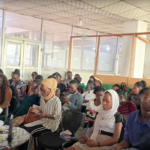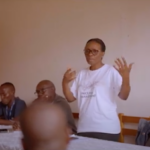
Farming, A profession of hope
Interviewed by Basemera Priscilla.
Alexander Ruhweza, a franchise support associate at Jibu Water with a specialty in agribusiness shares with us his journey in the agricultural sector.
Before you ventured into Agriculture, what were you doing?
Agriculture has always been my side business which I ventured in during my university days. I used to do part time work on a farm while in Australia. On my return to Uganda, desire to practice agriculture that can help me has never withered.
What type of Agriculture do you carry out?
At the moment, I practice animal husbandry, specifically cows and goats. I am also doing maize, soybean and passion fruit on a large scale in Fort Portal.
As a large-scale farmer, do you operate the passion fruit plantation as an individual or as a cooperative?
Actually, the passion fruit growing done on large scale falls under a project called KadAfrica and we specifically work with girls only.
Tell us more about this project. Why girls in particular?
Great question, firstly the girl child is more vulnerable, marginalised and have a number of problems she faces. Because of that, we designed this project where we recruit 20 -30 girls, look for a nearby church with free land and put that land to use. Churches have a lot of land available, so we sign a contract with them to use about 2 acres of their land for a minimum of three (3) years. This land is divided into sub plots and we provide seedlings and chemical inputs. After the crop is grown, we buy the harvest from them. With this, the girls come out empowered with both farming and business skills. This has greatly improved the standard of living for most of them and their family members.
What is the criteria for the girls you choose to work with?
Our focus is on the girl within the age brackets of 13 -24 years because statistically this group is vulnerable to evils such as early pregnancy, defilement, early marriages and STDs. Contextually, we felt it right to assist this fragile group hence the choice of criteria.
When did you start this project?
The project has been in existence for 7 years. I can proudly say that it has grown exponentially to about 70 acres of passion. In addition, we are slowly moving into soybean growing known as the Alexander Macrea project which will have a forward integration so as to produce processed soya products.
How many girls are you working with at the moment on KadAfrica?
Around 2,000 girls.
Is this project specific to areas within Fort Portal only and are there plans on expanding?
We are currently present in Kabarole and Kyenjojo but growing slowly as we are limited by funds. If we are to expand, we will do so within surrounding areas like Kyegegwa, Kasese, Bundibugyo and Ntoroko.

Effects of COVID-19 on FBOs
By Communications Staff
Agribusiness Development Centre (ADC) supports farmers in 4 different regions of the country by training them in good governance, financial literacy, marketing and a special training for coffee and cocoa farmers in price risk management.
During the pandemic, ADC carried out a research through its experienced group of business advisors in the Eastern, Western, Central and Northern regions to find out how the pandemic had affected their businesses and lives so that solutions are found to the challenges.
Below are some of the challenges and some of the solutions ADC adopted:
- Drop in Prices for example milk ugx 800-500, Cocoa 7000-6500 which leads to increased side selling.
- High Prices of Agricultural Inputs like quality Seeds/Fertilizers or pesticides.
- Low liquidity levels for SACCOs due to low Savings, and credit due to lack of mobilization [Two most areas where SACCOs remain Liquid]
- There is a high default lending {90% of borrowers are into arrears]
- Low subscriber growth because of halt in operations which means there are no new members coming registering
- Lost contracts with Buyers [Millers] because the FBOs could not meet the required quantity.
- Exporters are holding on stock, no longer buying from local buyers. [Cocoa – Bundibugyo]
All the above challenges need a combined effort from ADC and its partners to support the FBOs to get back on their feet.
ADC has created an e learning tool to give farmers trainings virtually to continue building their capacity so that they can become self-sufficient. An SMS system was also adopted during the lockdown, daily messages that enlightened farmers on measures of how to keep safe from COVID19 and the daily tips on financial literacy especially during a crisis.
ADC also created a WhatsApp group where most farmers who have smart phones can interact and share experiences but most importantly it acts as a market connection for farmers who advertise on the platform but also referrals from the Business Advisors and processors on the group.
Finally, one of ADC’s effort is towards working with Partners to create packages and develop sustainable modules to support farmers.
Great appreciation goes to those that have supported ADC to be able to continue supporting Farmer Based Organizations (FBOs).

A successful SOMA Digital Campaign
Interviewed by Basemera Priscilla.
Maximization of online opportunities with SOMA Digital Campaign.
With the existence of the global pandemic COVID-19 and its impact on business activities, Agribusiness Development Centre (ADC) utilized the internet as a link to farmers, farmer-based organizations (FBOs) and the general public who have been spending most of their time at home and on their smartphones.
Online channels have been an ideal way of raising awareness of activities that businesses are indulging in during the ongoing pandemic. ADC through a digital campaign labeled “Register to Win” launched SOMA, an e-learning platform specific to agribusiness on its social media channels Facebook, Twitter and Instagram. SOMA can be accessed on www.soma.adc.ug. The main aim of this campaign was to encourage people to sign-up for lessons on the SOMA platform. The 1st 10 people to register each week were hosted at the ADC offices in Kampala on Plot 1 Mackinnon Road for an interaction with the ADC Team and in appreciation of their efforts parted with a gift hamper.
This campaign ran for 4 weeks bringing in a total of 40 winners.
From the 40 winners, only 14 were within Kampala during the campaign and shared their experience with SOMA upon their visit to the ADC offices. These 14 winners comprised of students, farmers, teachers and businessmen to mention but a few.
At this gathering, the ADC Team was represented by the Ag. General Manager, Emmanuel Obuko; Head of Communication and Marketing, Katia Mugenzi and Software Engineer, William Ssenyondo who developed the SOMA platform.
Watch the video below to catch a glimpse of what some of the winners had to say about SOMA.
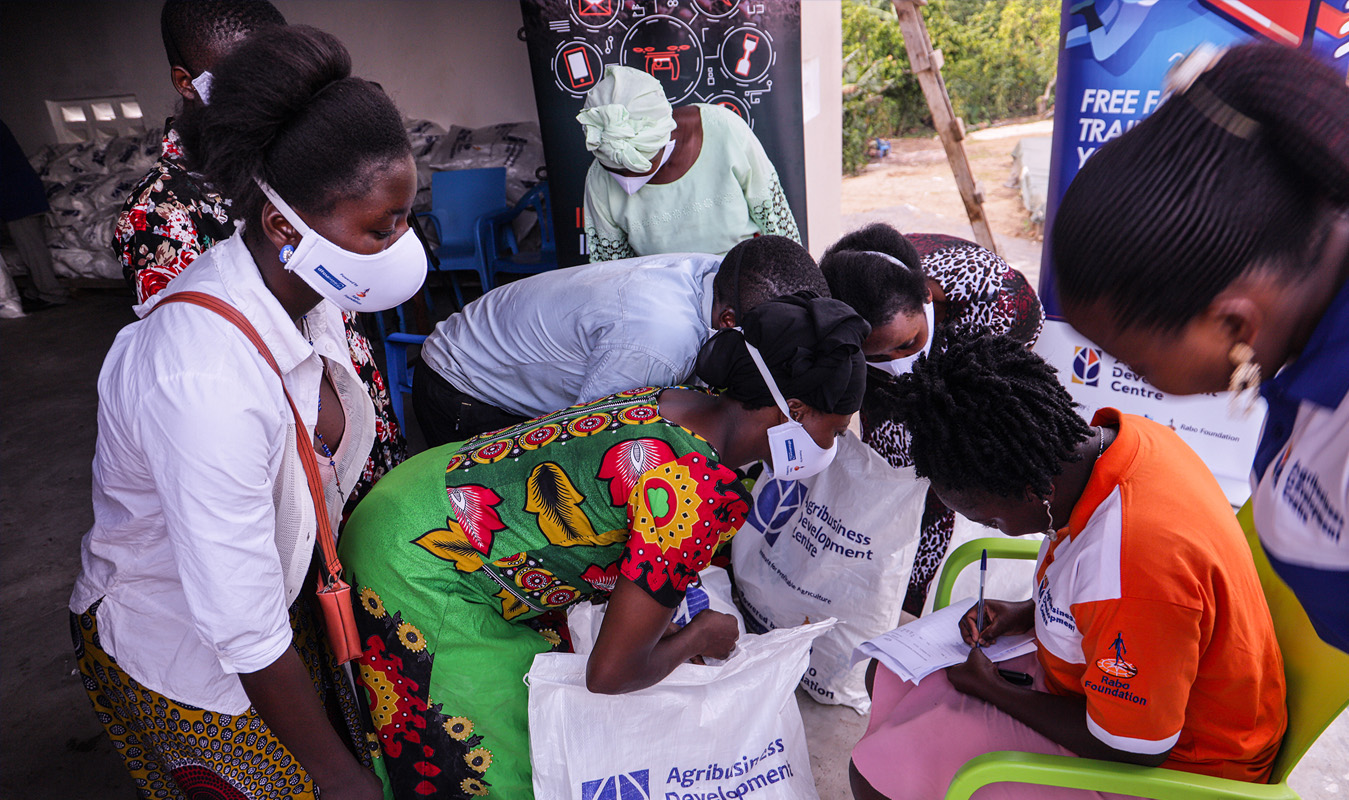
COVID19 Relief extended to farmers
By Mugenzi Katia
Rabo Foundation, DFCU Bank through its partner ADC extended relief to farmers affected by both COVID19 and flooding.
In light of the COVID 19 pandemic and natural disasters; landslides that have adversely affected some of the members of supported FBOs, the Agribusiness Development Centre (ADC) together with its investment partners Rabo Foundation and DFCU bank extended food assistance, sanitation and personal protective equipment to over 350 small holder farming households which were affected by the recent landslides in Bundibugyo, and COVID 19 affected vulnerable households in Kamuli and Masaka districts.
The 350 affected small holder farmers are among the over 8000 trained members of Farmer Based Organizations currently in ADCs Agribusiness Training program. Each household received a package consisting of 20Kgs of Maize Flour, 10Kgs of Beans, 5kgs of Cassava Flour, 5kgs of Rice, 1 liter of Cooking Oil, 3 Packets of Salt and 2 Bars of iodized salt and a mask.
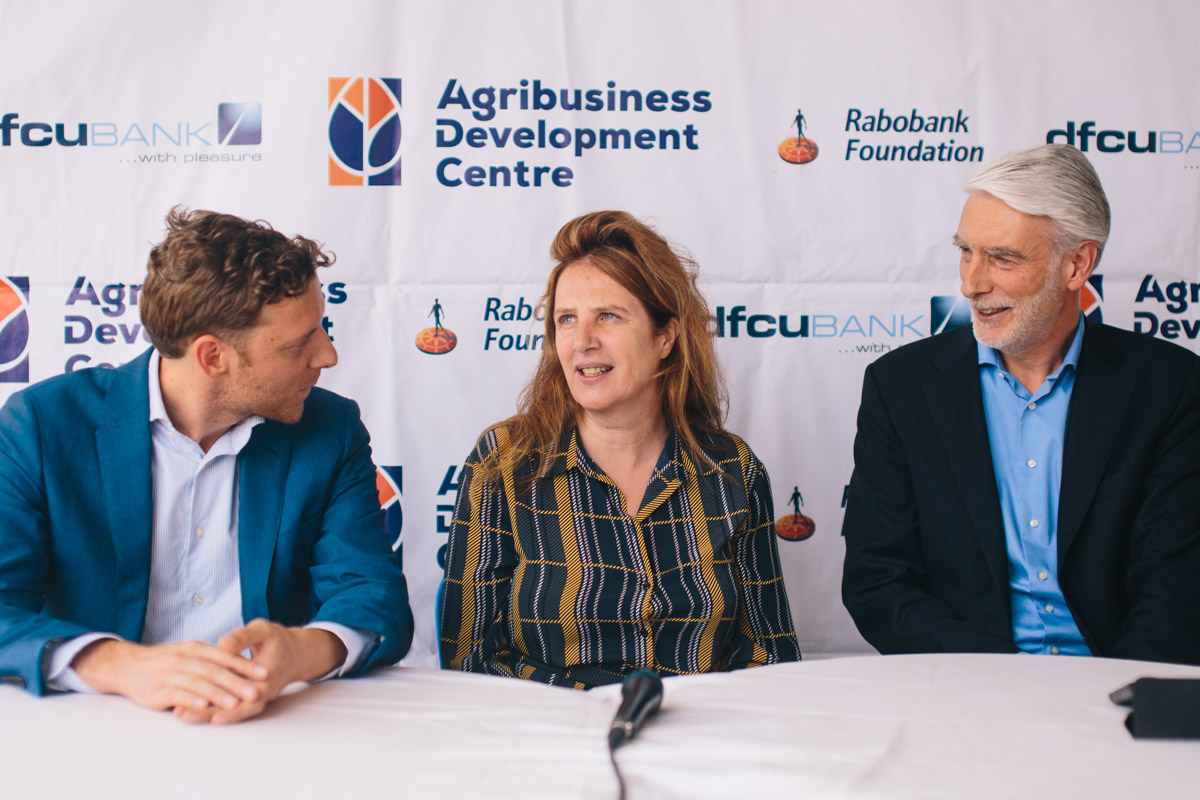
Laboremus partners with ADC, Rabobank to develop dairy industry
ADC, Rabobank Foundation and Laboremus Uganda are happy to announce a partnership to help Uganda’s dairy farmers and cooperatives grow. The three parties are signing an agreement today to bring Emata to even more dairy farmers and cooperatives in Uganda.
As part of the agreement, Rabobank Foundation will support the continuous development of the Emata solution. Moreover, ADC-supported cooperatives will get access, training and support for the Emata solution.
Emata makes managing a cooperative easy. The solution unravels administrative clutter, increases transparency and turns risky bulk cash transactions into safe one-click digital payments. On top of this, Emata provides greatly needed insight into daily operations. This helps farmers and cooperatives make better and more informed decisions.
Through Emata, ADC cooperatives will gather information about the productivity of their farmers, as well as understand which farmers are performing well and which require more training. Emata also facilitates communication between the cooperative and the farmers, and settle payments based on daily prices. As Emata can be operated offline, it even works in areas with fluctuating data connectivity.
“Laboremus is excited to partner with the Rabobank Foundation and ADC, two organizations that share our vision for the potential and future of the agricultural sector in Africa. Through smart use of both technology and field training, we believe that this partnership will build a foundation on which cooperatives and farmers can grow stronger, more efficient and prosperous,” says Bram van den Bosch, Managing Director of Laboremus.
See highlights from the press conference here, courtesy of UBC Business Roundup:
SOURCE: LABOREMUS
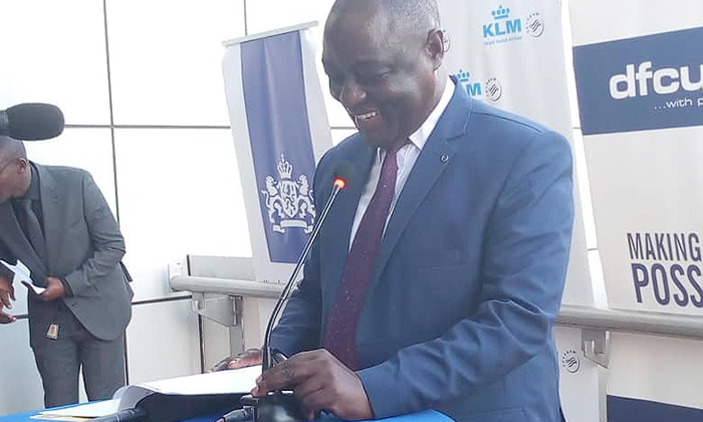
Minister Sempijja urges farmers on mechanization
The Agriculture minister, Vincent Sempijja has asked farmers to embrace agriculture mechanization practices to simplify farming and achieve higher yields.
“Many people have large chunks of land but none of them has a bull dozer to ease farming,” said Sempijja, adding that the Government shall soon introduce regional mechanization centres, aimed at transforming agriculture.
“Most of our products are on demand in various markets worldwide.
For example, the Arab market, wants our fruits and cereals.
“Russia, China and the United States, are the other countries with high demand for our products. However, it is sad that we can not produce the quantity they need,” he said.
This was during the flagging off ceremony for 10 winners in the 2017 best farmer competition, organised by Vision Group and sponsored by the Embassy of Netherlands in Uganda, dfcu Bank and KLM Airlines. The event took place at dfcu offices in Nakasero on Thursday evening. The farmers are set to travel on Saturday. The Vision Group Chief Executive Officer, Robert Kabushenga appealed to banks to put in place special loan services for farmers. For instance, mechanisms on quick access to loans, favorable payment periods, among others.
“You may end up making more money if you reduce interest rates on loans for farmers,” he said, adding that most of them need quick loans.
He said one of the things he intends to learn from Netherlands is farm management systems. Henk Jan Bakker, the Dutch Ambassador to Uganda explained that the private sector players in Uganda can only thrive once Government creates an enabling environment for them to operate in. He appealed to farmers travelling to Netherlands to act as mindset change agents in their communities especially to those taking part in agriculture. Jimmy Mugerwa, the dfcu bank’s board chairman applauded Vision Group and partners for their contribution towards agriculture transformation, through organising such farmer competition.
“We as dfcu bank pledge to support and continue supporting these competitions,” he said.
Netherlands farmers’ tour a good move
Anja de Feijter, the chairperson Netherlands-Uganda Trade and Investment Platform (NUTIP) noted that such farmers will learn a lot on mechanization, efficiency and agribusiness management ideas from Netherlands.
Feijter, who is also the executive director Agribusiness Development Centre (ADC) said Uganda has a lot of opportunities in agriculture with its favorable climate and fertile soils but the sector (agriculture) has been contributing less to the economy.
She attributed the issue to use of traditional farming methods, low financial literacy skills and lack of information on available markets for their products.
He noted that once farmers get access to quality inputs coupled with modern farming practices, the contribution of agriculture towards GDP can increase from the current 25%.
“Currently over 70% of Uganda’s population is involved in agriculture but the sector contributes only 25% to GDP. The sector capable of contributing even 50% if farmers get enough access to knowledge in agriculture and quality inputs, ”she stated.
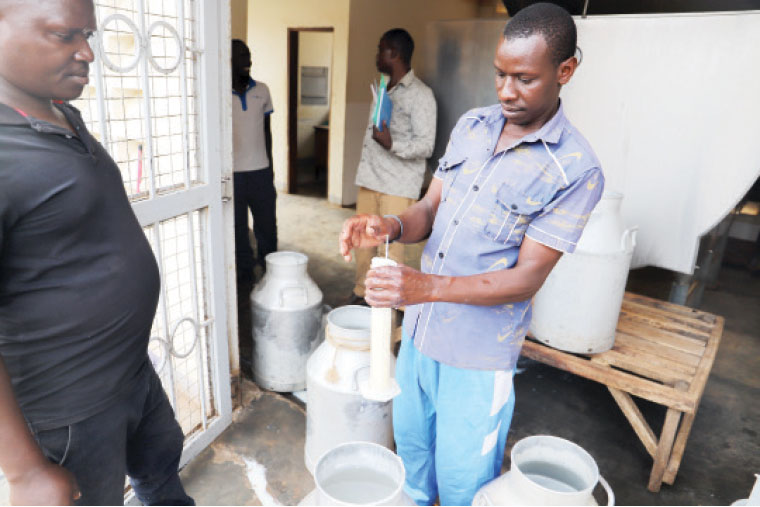
How a new emata app is boosting dairy production
A new mobile app is bringing financial products to farmers across East Africa. Emata is tailored for dairy farmers and will allow them to use the power of loans to invest in the productivity of their farms.
Through transparent recording, the app will also ensure daily milk deliveries are registered whereby the farmer automatically gets instant information about the quantity and price of the milk delivery, writes BAKER BATTE LULE from The Observer.
According to statistics from Uganda Dairy Development Authority, out of Uganda’s annual milk production of 2.5 billion litres, 80 per cent is sold while 20 per cent is consumed by the producing households.
But much as the biggest percentage is sold, farmers barely get what is due of their efforts. Oftentimes, middlemen take the lion’s share of proceeds from milk and this is so because farmers face challenges such as difficulty in accessing the market, production on a small scale by individual farmers and failure to access financial services to improve on production, among others.
It is for such bottlenecks that Laboremus, a financial and technology company based in Kampala with roots in Norway, teamed up with the Agriculture Development Centre [ADC] and the Rabobank Foundation to find solution.
The result of this partnership is Emata, an online app that helps farmers access credit, know about the prices of milk as well as access animal drugs and feeds, among others. According to Bram Willen van den Bosch, the managing director of Laboremus, Emata technology will go a long way in uplifting the standards of living of rural farmers.
Because of this, Agribusiness Development Centre (ADC)-supported cooperatives can now get access, training and support for the Emata solution. Through the app that can also work without internet access, Emata is building a credit history through digitising milk delivery systems. Using this information, Laboremus then extends credit to farmers, having assessed the productivity of their farms.
Loans are processed and given out using the phone without one having to first go to a credit facility. Recently, Laboremus, ADC and Rabobank Foundation signed a memorandum of understanding to work together to see the success of the app.
In the memorandum, Rabobank Foundation, which holds majority shares in Dfcu bank Uganda is to provide finance to Laboremus to carry out a pilot study of the app starting with the Bugerere Dairy Cooperative Society.
On the other hand, ADC which already works with the cooperative society that was started in 1968 and boasts of 330 members to provide training on how to manage a cooperative and also financial literacy, will continue to educate dairy farmers on how they can leverage working with the app.
Speaking at the signing of the memorandum of understanding in Kampala recently, Bosch said farmers are yet to benefit fully from dairy farming because of lack of information. He said using cooperatives to reach out to individual farmers has been a successful mode elsewhere in the world; that’s why they want to try it out in Uganda.
“The potential for agriculture in this country is very high but we believe that technology is the future for farmers. We want to improve the way cooperatives are managed in all forms, including financial management,” Bosch said. He added that Laboremus is happy to work with Rabobank Foundation, the biggest agricultural bank in the world, and ADC, to improve agriculture not only in Uganda but the whole of Africa but using Uganda as a model”
“Through smart use of both technology and field training, we believe that this partnership will build a foundation on which cooperatives and farmers can grow stronger, more efficient and prosperous.”
Emata was launched in 2017 with a vision to provide affordable loans to farmers across East Africa. Commercial banks rarely give loans to especially small-scale farmers for the risks associated with the agricultural sector such as bad harvests, price fluctuations and drastic changes in weather, among others.
For her part, Anja de Feijter, the managing director of ADC, said they will continue to provide financial literacy to farmer groups so as to increase household incomes.
“The diary sector is very important to Uganda’s economy; that’s why we realised the need for training and financing especially using technology to develop individual farmers to improve their livelihood,” de Feijter said, adding that by 2022, they will have trained 180,000 farmers.”
Pim Mol, the managing director of Rabobank Foundation, said they have interest in growing agriculture in Uganda so as to use it as a success model elsewhere in Africa.
“There is a very good possibility to develop innovative ways to change livelihoods for farmers. Access to finance across the country, we believe, will significantly improve the agricultural sector in Uganda like it has done elsewhere in Europe where we have worked,” Mol said
He added that the dairy sector is data-driven; therefore, there is need to provide farmers with relevant information on how to improve production and also get better prices for their products.
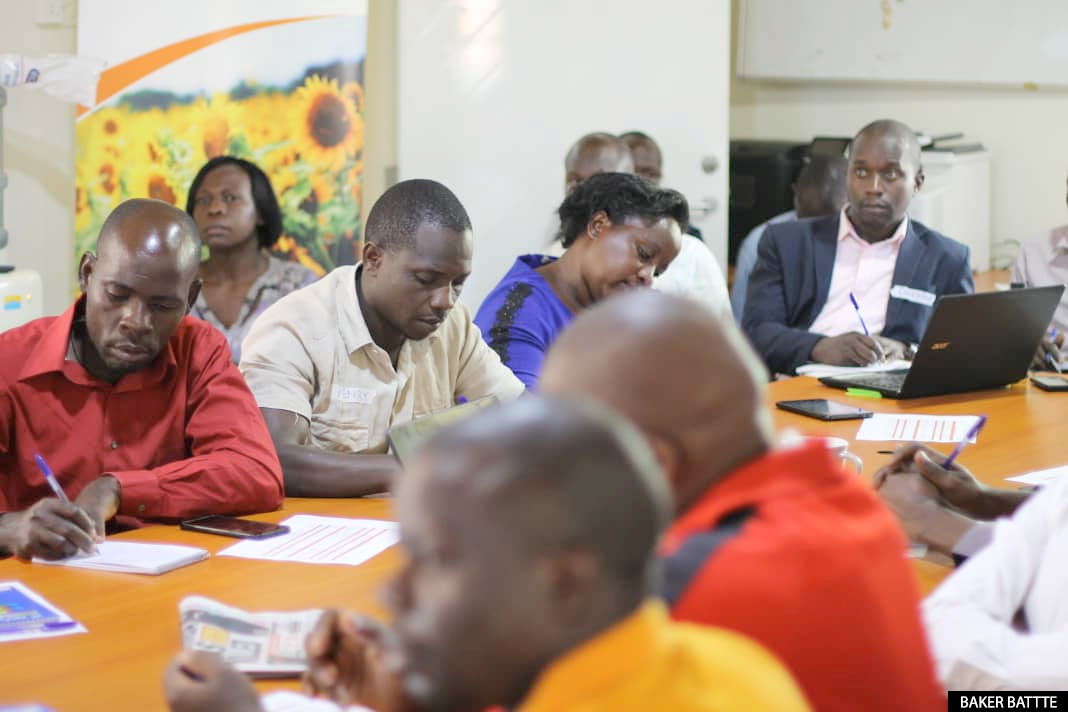
More effort needed for Uganda to meet coffee export target
For Uganda to achieve its 2025 vision of exporting 20 million bags of coffee, there must be concerted efforts of all stakeholders. This was the message of Anja de Fijter, the executive director of the Agribusiness Development Centre (ADC) at a two-day training of farmer based organisation leaders in Kampala. The leaders of 64 farmer groups were in Kampala to be coached on how to manage market risks by knowing about the prices of coffee on both the national and international market before selling.
“We see that farmer-based organisations still need a lot of support in this area, they need to learn what influences the price of coffee. It is not only Uganda that influences prices at the international market but the different producing countries,” de Fijter said.
“Uganda wants to export 20 million bags of coffee in 2025 and everybody who has interest in coffee should work in a united way to promote the sector because it’s a very important sector.”
It is estimated that Uganda has over 1.7 million coffee farmers looking after about 900 million coffee trees. This makes it the biggest coffee planting country in East Africa.
“If we can get our sector organised, get farmers access to finance, then we can know that we can meet the 20 million bags we are targeting,” de Fijter said.
Kizito Mayanja an official working with the Coffee Development Authority (UCD) was put to task by the participants to explain what government was doing to ensure that its 20 million bags target was achieved.
“Was this a political target aimed at exciting some people or indeed you are serious about it? What are you doing as government to ensure that it’s attained?” Andrew Mulwanyi, a farmer from Masaka asked.
Mayanja explained that as UCD they have moved in several parts of the country explaining to people about best farming practices. He added that they are also giving out millions of coffee seedlings to farmers across the country.
He was however noncommittal on whether the target of 20 million bags is attainable in 2025. Uganda currently exports 4.5 million bags of coffee per year. The training, part of the many so far organised by ADC, this time also targeted cocoa farmers because it is also increasingly becoming one of Uganda’s leading export earner. In 1990, Uganda did not export even a single tonne of cocoa but last year 24,000 metric tonnes of cocoa were exported fetching $48 million.
“It is really becoming a very serious export product for Uganda. That’s why we think that the farmers should be informed about the prices and protect themselves against market risks,” de Fijter said.
SOURCE: THE OBSERVER
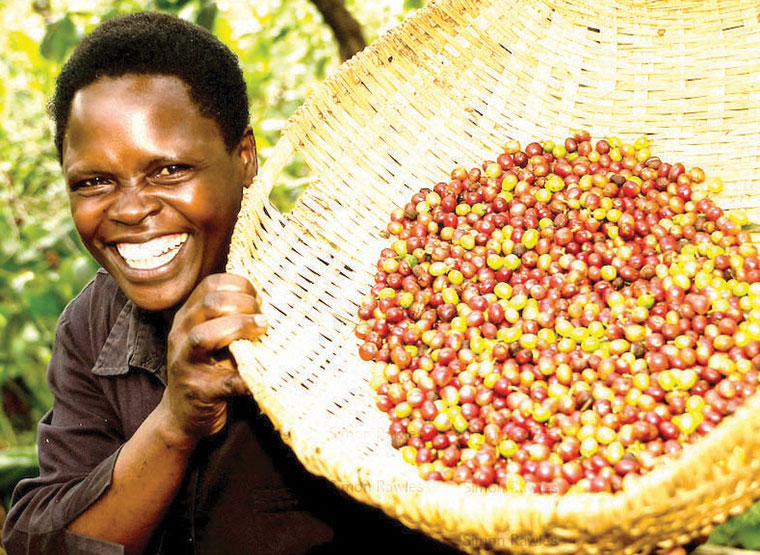
Coffee farmers trained to boost exports
At least 45 coffee farmers from across the country have received training on how to market and export their products. The Agribusiness Development Center (ADC) with support from the Rabobank Foundation and DFCU bank targeted mainly farmers who are also leaders of cooperatives on how to handle coffee fit for export, how to negotiate a contacts, and skills on how to get information for better prices.
Katia Mugenzi, ADC marketing and information manager said coffee farming has got very many risks but the biggest of all is pricing. Therefore, she said, there is need to train them in order to reduce the risk that majorly emanates from lack of information.
“The training was about price risk management, because many a time our farmers are cheated by middlemen; it is them who have information about the market. This is because most of the time coffee prices are determined elsewhere,” Mugenzi said.
She said their emphasis is on coffee exportation because there are other organizations that are already focused on production.
“It doesn’t make sense if farmers produce their coffee and they are unable to benefit from its sale. Therefore as ADC we are helping farmers especially those working under a cooperative to get pre-finances that is vital in exportation,” Mugenzi said.
She added that she was also very excited that young people are beginning to take agriculture seriously.
“It is very encouraging that we are now seeing youths getting involved in agriculture. This shows that the sector will register tremendous development,” Mugenzi said.
Anja de Fijter, the head of ADC said there is an increase in coffee exports. She said currently Uganda exports almost five million coffee bags. “There is no doubt people continue to embrace coffee growing; the sector has a bright future,” de Fijter said.
According to some of the trainees, the two day training couldn’t have come at a better time.
“I now know about contracts, all the terms involved in exporting. I don’t think buyers will be able to manipulate me again,” Ronald Odia, a farmer from Zombo said. For Matovu Richard a farmer from Mbale, the training helped him to equip him with knowledge to make better decisions.
“I have learnt how to negotiate for better prices not to take whatever the buyer offers after all it’s my coffee,” Matovu said. For Mary Nalukwata a farmer from Masaka, such training helps them to be competitive.
“We sell in the same markets with people from developed countries who are well conversant with the market dynamics yet for us we don’t even know what the markets want. Therefore this training was really beneficial to us,” Nalukwata said urging ADC to organize such training even at production level.
SOURCE: THE OBSERVER
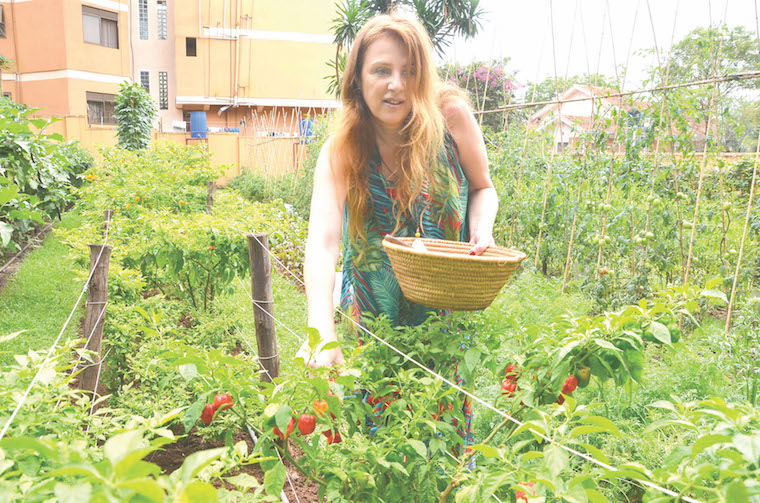
Anja de Feijter proud of her Ugandan passport; hopes for Ugandan burial
When Anja de Feijter first set foot in Uganda 17 years ago, she had no idea it would turn out to be her permanent home. Anja, the executive director of Agribusiness Development Center (ADC) – an initiative of the Robobank Foundation and dfcu bank – is just one of many foreigners that come to Uganda and never leave. Strange that as millions of Ugandans would give everything to ‘escape’ their country to settle in the Netherlands where Anja was born and raised, there are people in the West whose dream is to hold a Ugandan passport like Anja does.
EXODUS TO AFRICA
When she was told of an opportunity to work in the East African country, she started to do research and the results were not pleasant. The country was recovering from the deadly Ebola virus that had killed hundreds including championing medical workers such as St Mary’s hospital Lacor’s Dr Matthew Lukwiya.
This, on top of the HIV pandemic that was becoming Uganda’s new normal. Her peers thought she was mad to abandon a well-paying job, good house, car and good life to go to a ‘jungle infested with deadly viruses and backward people’, as many in the West still envisage Africa. But it was to Africa and Uganda that Anja headed and found happiness. Born in August 1967 in South Western Netherlands, Anja is the only child of agriculturalists Raines and Jannie de Feijter.
Coming from an agricultural family, Anja says, at a very young age she also developed love for agriculture.
“When I was 12, I told my parents I wanted to be the minister of agriculture. It was a bit strange for a young girl; others my age would want to be hairdressers,” she said in a recent interview. Anja’s father was born just after World War II, which had left a trail of destruction with de Feijter’s farm having no single animal left.
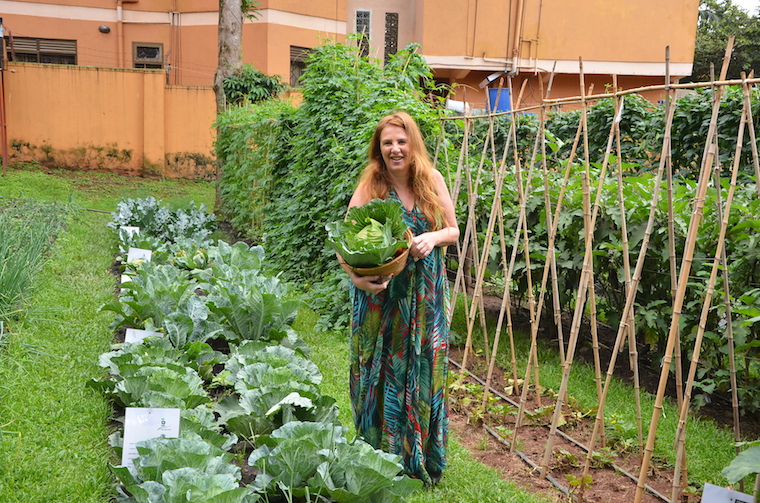
Anja’s father and his siblings could not go back to school. Anja says her father, hurt by not getting full education, worked very hard so his daughter would not suffer the same fate.
“He started his own business selling vegetables using a wheelbarrow; he became a very successful businessman,” Anja says.
Aged 16, Anja left her family home for Amsterdam to pursue education because her home district was not as developed. She went to a horticulture school for four years. Thereafter she moved to the Royal Tropical Institute in the east of Netherlands and pursued a course in international agricultural marketing for four years.
Finally, Anja proceeded to Wageningen University and Research Centre and pursued a degree in agricultural economics, graduating in 1996.
“I took the longest route to study to become an agricultural engineer; I was 28 when I graduated,” she says.
After graduating, she refused to go back to manage the family business, opting to look for a job in the capital. She says she looked for jobs in vain, triggering anger and frustration especially after many years of studying.
A friend told her of an advertisement for an agricultural IT consultant, but she had no idea about IT; nevertheless, she applied. She excelled during the interview as the most eloquent.
“They said they can teach me how to do programming but they were not sure they could teach the other guys how to communicate. I got the job of consultancy despite the fact that I had just left the university,” Anja says.
She worked with the company for four years until one of her clients challenged her on when she was planning to ever use her agriculture education.
ROYAL VAN ZANTEN
There was an opportunity in Uganda as director of an eight-hectare Dutch flower farm, Royal Van Zanten.
“I said, ‘I haven’t been to Uganda but if you can give me a ticket, I can go check it out’,” she says.
When she arrived in September 2000 she was very excited and felt right at home in Uganda.
“I went to Mukono to see how people would react; they were very friendly; everyone was greeting me like I had been part of them. It was a normal thing to see a mzungu on the street. I said to myself, I think I should try the job,” Anja says.
She says that decision was not hard at all, seeing that she had no partner or children to worry about.


